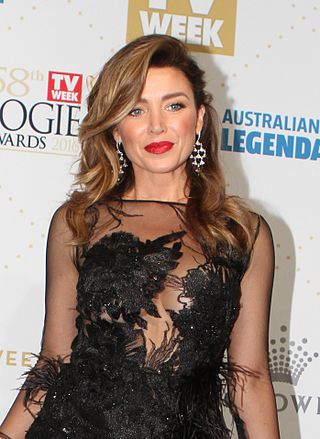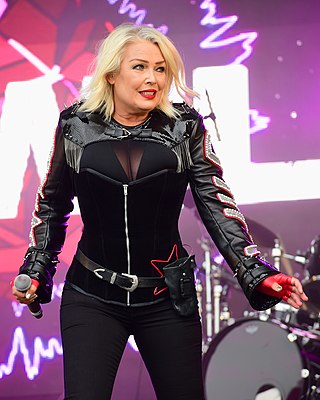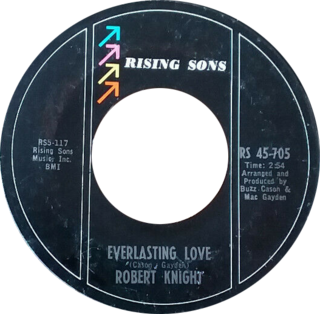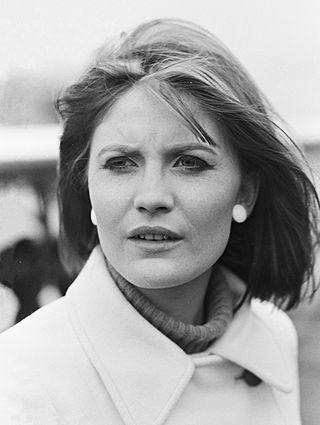
DanniiMinogue is an Australian singer, television personality, and actress. She first gained recognition for her appearances on the television talent show Young Talent Time (1982–1988) and for her role as Emma Jackson on the soap opera Home and Away (1989–1990). Minogue began her music career in the early 1990s, achieving early success with her debut studio album, Love and Kisses (1991), which was certified gold by the British Phonographic Industry (BPI) and included the singles "Love and Kisses", "Jump to the Beat" and "Success". Following the release of her second studio album, Get into You (1993), Minogue's popularity as a singer had declined, leading her to make a name for herself with award-winning performances in theatre productions.

Vasiliki Papathanasiou, known professionally as Vicky Leandros, is a Greek singer living in Germany. She is the daughter of singer, musician and composer Leandros Papathanasiou. In 1967, she achieved worldwide fame after gaining fourth place for the country of Luxembourg in the Eurovision Song Contest with the song "L'amour est bleu", which became a worldwide hit. She further established her career by winning the Eurovision Song Contest in 1972 with the song "Après Toi", again representing Luxembourg.
The United Kingdom was represented at the Eurovision Song Contest 1976 with the song "Save Your Kisses For Me", written by Tony Hiller, Lee Sheriden, and Martin Lee, and performed by Brotherhood of Man. The British participating broadcaster, the British Broadcasting Corporation (BBC), selected its entry through a national final titled A Song for Europe 1976. The entry eventually won the Eurovision Song Contest.
Stephanie De Sykes is an English singer and actress.
The United Kingdom was represented at the Eurovision Song Contest 1980 with the song "Love Enough for Two", written by Stephanie de Sykes and Stuart Slater, and performed by the group Prima Donna. The British participating broadcaster, the British Broadcasting Corporation (BBC), selected its entry through a national final.
The United Kingdom was represented at the Eurovision Song Contest 1984 with the song "Love Games", written by Paul Curtis and Graham Sacher, and performed by Belle and the Devotions. The British participating broadcaster, the British Broadcasting Corporation (BBC), selected its entry through a national final.
The United Kingdom was represented at the Eurovision Song Contest 1998 with the song "Where Are You?", written by Scott English, Phil Manikiza, and Simon Stirling, and performed by Imaani. In addition, the British Broadcasting Corporation (BBC) was also the host broadcaster and staged the event at the National Indoor Arena in Birmingham on 9 May 1998 after it won the competition in 1997 with the song "Love Shine a Light" performed by Katrina and the Waves. The BBC organised a public selection to select its entry for the contest, The Great British Song Contest 1998. Eight songs competed over two rounds, with four songs selected through a radio-broadcast semi-final advancing to the televised final round, held on 15 March 1998, where viewers selected the winning entry through televoting. Imaani received the most votes and was selected to represent the UK in the contest with the song "Where Are You?". She performed 16th at the international contest, and at the close of the voting process the UK finished in second place with 166 points, the nation's 15th second-place finish since its debut.

Kim Wilde is an English pop singer. She first gained success in 1981 with her debut single "Kids in America", which peaked at No. 2 in the UK. In 1983, she received the Brit Award for Best British Female solo artist. In 1986, she had a UK No. 2 hit with a reworked version of the Supremes' song "You Keep Me Hangin' On", which also topped the US Billboard Hot 100 in 1987. Between 1981 and 1996, she had 25 singles that charted within the Top 50 of the UK Singles Chart. Her other hits include "Chequered Love" (1981), "You Came" (1988), and "Never Trust a Stranger" (1988). In 2003, she collaborated with Nena on the song "Anyplace, Anywhere, Anytime", which topped the Dutch and Austrian charts.

Sandra Ann Lauer, later Sandra Cretu, commonly known mononymously as Sandra, is a German pop singer who enjoyed mainstream popularity in the 1980s and early 1990s with a string of European hit singles, produced by her then-husband and musical partner, Michael Cretu, most notably "(I'll Never Be) Maria Magdalena" (1985), "In the Heat of the Night" (1985), "Everlasting Love" (1987), "Secret Land" (1988), "Hiroshima" (1990), and "Don't Be Aggressive" (1992). Her albums Into a Secret Land (1988) and Close to Seven (1992) have won Sandra high critical acclaim.
Gina G is an Australian former singer who represented the United Kingdom at the Eurovision Song Contest in 1996, with the song "Ooh Aah... Just a Little Bit", which reached No. 1 in the UK Singles Chart. The song also reached the US top 20 in 1997 and earned her a 1998 Grammy Award nomination for Best Dance Recording. Her other UK Top 30 hits are "I Belong to You" #6 (1996), "Fresh" #6 (1997), "Ti Amo" #11 (1997) and "Gimme Some Love" #25 (1997).

Alma Angela Cohen Cogan was an English singer of traditional pop in the 1950s and early 1960s. Dubbed the "Girl with the Giggle in Her Voice", she was the highest paid British female entertainer of her era.

Eurovision: You Decide is the most recent name of a BBC television programme that was broadcast annually to select the United Kingdom's entry for the Eurovision Song Contest. The show had previously gone under several other names, including Festival of British Popular Songs (1957), Eurovision Song Contest British Final (1959–1960), The Great British Song Contest (1996–1999), Eurovision: Making Your Mind Up (2004–2007), Eurovision: Your Decision (2008), and Eurovision: Your Country Needs You (2009–2010), but was known, for most of its history, as A Song for Europe.

"Everlasting Love" is a song written by Buzz Cason and Mac Gayden, originally a 1967 hit for Robert Knight and since covered numerous times. The most successful version in the UK was performed by Love Affair and the highest-charting version in the U.S. was performed by Carl Carlton. Other cover versions were done by Town Criers, Rex Smith & Rachel Sweet, Sandra Cretu, U2 and Gloria Estefan.

Prima Donna were the United Kingdom representatives in the Eurovision Song Contest 1980. The group comprised sisters Kate and Jane Robbins, Sally Ann Triplett, Danny Finn, Alan Coates and Lance Aston. Finn was a former member of The New Seekers and was married to fellow ex-New Seeker Eve Graham. Robbins later embarked on a successful career as a comedian, impressionist and actress.

"Jack in the Box", written by David Myers and composed by John Worsley, was the United Kingdom's entry at the Eurovision Song Contest 1971, performed by the Northern Irish singer Clodagh Rodgers.

"Knock, Knock Who's There?" is a song written and composed by John Carter and Geoff Stephens, released on Apple Records. It was originally sung and recorded by the Welsh singer Mary Hopkin and was the United Kingdom's entry at the Eurovision Song Contest 1970, where it came second. The single version was produced by Mickie Most and reached No. 2 on the UK charts.

Lucie Bethan Jones is a Welsh singer, musical theatre actress, and model. Jones first came to prominence while competing on series 6 of The X Factor UK in 2009, where she finished eighth. She represented the United Kingdom in the Eurovision Song Contest 2017 with the song "Never Give Up on You", finishing with 111 points in 15th place.

Sandra Ann Goodrich, known by her stage name Sandie Shaw, is a retired English pop singer. One of the most successful British female singers of the 1960s, she had three UK number one singles with "(There's) Always Something There to Remind Me" (1964), "Long Live Love" (1965) and "Puppet on a String" (1967). With the latter, she became the first British entry to win the Eurovision Song Contest. She returned to the UK Top 40, for the first time in 15 years, with her 1984 cover of the Smiths song "Hand in Glove". Shaw retired from the music industry in 2013.
The Netherlands was represented at the Eurovision Song Contest 1976 with the song "The Party's Over", written by Hans van Hemert, and performed by Sandra Reemer. The Dutch participating broadcaster, Nederlandse Omroep Stichting (NOS), selected its entry through a national final. In addition, NOS was also the host broadcaster and staged the event at the Nederlands Congresgebouw in The Hague, after winning the previous edition with the song "Ding-a-dong" by Teach-In. This was the second of Reemer's three Eurovision appearances for the Netherlands: she had sung in the 1972 contest in a duo with Dries Holten (Andres), and would also take part in the 1979 contest under the name of Xandra.











